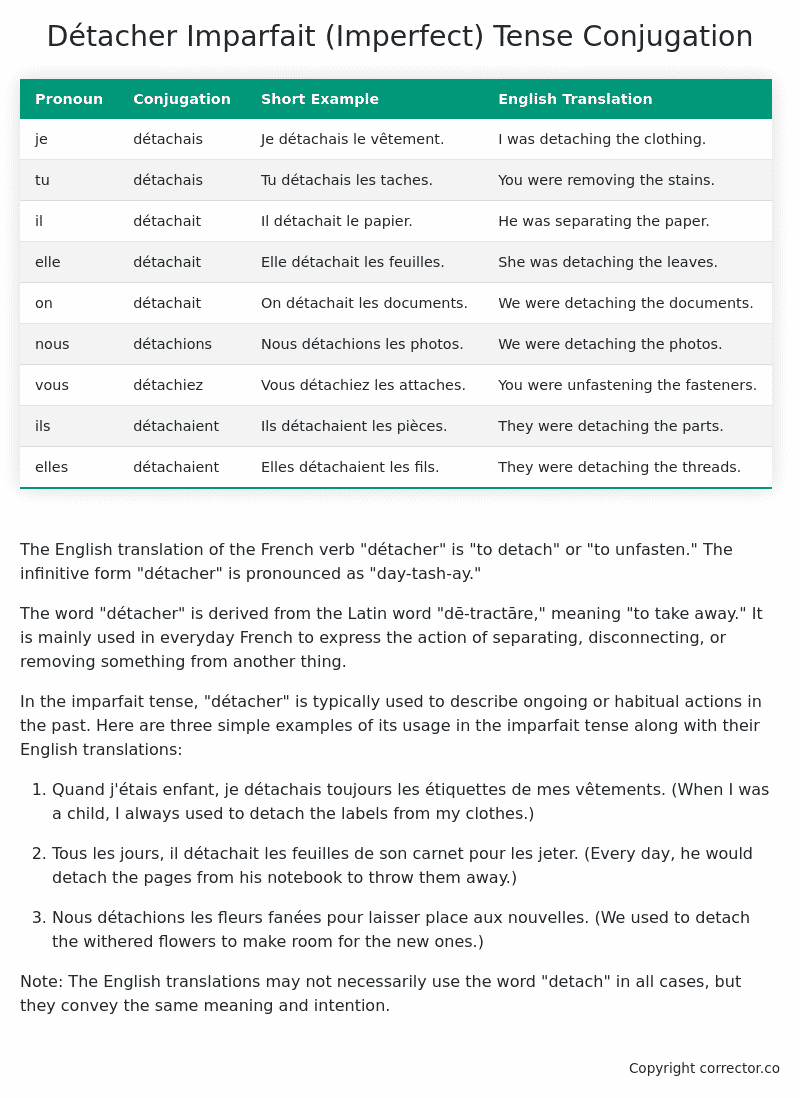Imparfait (Imperfect) Tense Conjugation of the French Verb détacher
Introduction to the verb détacher
The English translation of the French verb “détacher” is “to detach” or “to unfasten.” The infinitive form “détacher” is pronounced as “day-tash-ay.”
The word “détacher” is derived from the Latin word “dē-tractāre,” meaning “to take away.” It is mainly used in everyday French to express the action of separating, disconnecting, or removing something from another thing.
In the imparfait tense, “détacher” is typically used to describe ongoing or habitual actions in the past. Here are three simple examples of its usage in the imparfait tense along with their English translations:
-
Quand j’étais enfant, je détachais toujours les étiquettes de mes vêtements.
(When I was a child, I always used to detach the labels from my clothes.) -
Tous les jours, il détachait les feuilles de son carnet pour les jeter.
(Every day, he would detach the pages from his notebook to throw them away.) -
Nous détachions les fleurs fanées pour laisser place aux nouvelles.
(We used to detach the withered flowers to make room for the new ones.)
Note: The English translations may not necessarily use the word “detach” in all cases, but they convey the same meaning and intention.
Table of the Imparfait (Imperfect) Tense Conjugation of détacher
| Pronoun | Conjugation | Short Example | English Translation |
|---|---|---|---|
| je | détachais | Je détachais le vêtement. | I was detaching the clothing. |
| tu | détachais | Tu détachais les taches. | You were removing the stains. |
| il | détachait | Il détachait le papier. | He was separating the paper. |
| elle | détachait | Elle détachait les feuilles. | She was detaching the leaves. |
| on | détachait | On détachait les documents. | We were detaching the documents. |
| nous | détachions | Nous détachions les photos. | We were detaching the photos. |
| vous | détachiez | Vous détachiez les attaches. | You were unfastening the fasteners. |
| ils | détachaient | Ils détachaient les pièces. | They were detaching the parts. |
| elles | détachaient | Elles détachaient les fils. | They were detaching the threads. |
Other Conjugations for Détacher.
Le Present (Present Tense) Conjugation of the French Verb détacher
Imparfait (Imperfect) Tense Conjugation of the French Verb détacher (You’re reading it right now!)
Passé Simple (Simple Past) Tense Conjugation of the French Verb détacher
Passé Composé (Present Perfect) Tense Conjugation of the French Verb détacher
Futur Simple (Simple Future) Tense Conjugation of the French Verb détacher
Futur Proche (Near Future) Tense Conjugation of the French Verb détacher
Plus-que-parfait (Pluperfect) Tense Conjugation of the French Verb détacher
Passé Antérieur (Past Anterior) Tense Conjugation of the French Verb détacher
Futur Antérieur (Future Anterior) Tense Conjugation of the French Verb détacher
Subjonctif Présent (Subjunctive Present) Tense Conjugation of the French Verb détacher
Subjonctif Passé (Subjunctive Past) Tense Conjugation of the French Verb détacher
Subjonctif Imparfait (Subjunctive Imperfect) Tense Conjugation of the French Verb détacher
Subjonctif Plus-que-parfait (Subjunctive Pluperfect) Tense Conjugation of the French Verb détacher
Conditionnel Présent (Conditional Present) Tense Conjugation of the French Verb détacher
Conditionnel Passé (Conditional Past) Tense Conjugation of the French Verb détacher
Conditionnel Passé II (Conditional Past II) Tense Conjugation of the French Verb détacher
L’impératif Présent (Imperative Present) Tense Conjugation of the French Verb détacher
L’impératif Passé (Imperative Past) Tense Conjugation of the French Verb détacher
L’infinitif Présent (Infinitive Present) Tense Conjugation of the French Verb détacher
L’infinitif Passé (Infinitive Past) Tense Conjugation of the French Verb détacher
Le Participe Présent (Present Participle) Tense Conjugation of the French Verb détacher
Le Participe Passé (Past Participle) Tense Conjugation of the French Verb détacher
Struggling with French verbs or the language in general? Why not use our free French Grammar Checker – no registration required!
Get a FREE Download Study Sheet of this Conjugation 🔥
Simply right click the image below, click “save image” and get your free reference for the détacher imparfait tense conjugation!

Détacher – About the French Imparfait Tense
NOTE: To take a deep dive into all the French tenses then see our article on Mastering French Tense Conjugation.
Formation of the Imparfait Tense
For regular -er verbs:
For regular -ir verbs
For regular -re verbs
Common Everyday Usage Patterns
Description of Past Habits
Background Information
Mental and Emotional States
It’s employed to express emotions, thoughts, or physical sensations in the past. For example: “J’étais content quand il est arrivé.” (I was happy when he arrived.)
Ongoing Actions
Points to Note About the Imparfait Tense
Passé Composé vs. Imparfait
Conditional
Si Clauses
Narration
I hope you enjoyed this article on the verb détacher. Still in a learning mood? Check out another TOTALLY random French verb imparfait conjugation!


